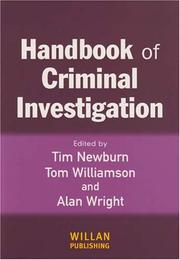| Listing 1 - 10 of 170 | << page >> |
Sort by
|
Book
Publisher: [Place of publication not identified] : [publisher not identified],
Abstract | Keywords | Export | Availability | Bookmark
 Loading...
Loading...Choose an application
- Reference Manager
- EndNote
- RefWorks (Direct export to RefWorks)
Corrections --- Arrests --- Police brutality --- Police forces --- Criminal investigations --- Police officers
Book
Publisher: [Place of publication not identified] : [publisher not identified],
Abstract | Keywords | Export | Availability | Bookmark
 Loading...
Loading...Choose an application
- Reference Manager
- EndNote
- RefWorks (Direct export to RefWorks)
Corrections --- Arrests --- Police brutality --- Police forces --- Criminal investigations --- Police officers
Book
Year: 2022 Publisher: Nijmegen Radboud University Press
Abstract | Keywords | Export | Availability | Bookmark
 Loading...
Loading...Choose an application
- Reference Manager
- EndNote
- RefWorks (Direct export to RefWorks)
As a result of society’s increasing digitisation, the police have ever more opportunities to collect, investigate and combine huge amounts of personal data using advanced technology. Examples are provided from recent cases where police have gained access to millions of encrypted messages from various servers, including Ennetcom, EncroChat and Sky Global. However, the current legal framework is, as yet, ill-equipped to deal with this new reality. Partly for this reason, legislators are facing new questions about how the (further) processing of data in detection should be regulated by law. Commissioned by the WODC, this study examines the legal safeguards in criminal justice data collection in relation to the legal safeguards governing the processing of these data. The Code of Criminal Procedure mainly focuses on the collection of data and to a much lesser extent on its further use, but this may involve a (fresh) invasion of citizens’ privacy. The Police Data Act contains some provisions to data processing, but the relationship with the Dutch Code of Criminal Procedure is not entirely clear. This study identifies the requirements and safeguards under European law for the processing of data for criminal justice purposes. Further inspiration is drawn from experience with the Intelligence and Security Services Act 2017 in which powers of collection and (further) processing are regulated in a single law. Finally, it explores how, in several countries (Germany, Belgium and Norway), the requirements arising from European law have been translated into legal regulations and how these regulations are designed. This study provides tools that legislators can use to reconsider the methods of standardisation and legal regulation design to better protect citizens' privacy. The recommendations thus focus on strengthening the legal framework on data processing and its supervision by creating an explicit legal framework in the Code of Criminal Procedure and establishing an independent supervisor focused on the processing of personal data by investigative authorities.
Book
Year: 2022 Publisher: Nijmegen Radboud University Press
Abstract | Keywords | Export | Availability | Bookmark
 Loading...
Loading...Choose an application
- Reference Manager
- EndNote
- RefWorks (Direct export to RefWorks)
As a result of society’s increasing digitisation, the police have ever more opportunities to collect, investigate and combine huge amounts of personal data using advanced technology. Examples are provided from recent cases where police have gained access to millions of encrypted messages from various servers, including Ennetcom, EncroChat and Sky Global. However, the current legal framework is, as yet, ill-equipped to deal with this new reality. Partly for this reason, legislators are facing new questions about how the (further) processing of data in detection should be regulated by law. Commissioned by the WODC, this study examines the legal safeguards in criminal justice data collection in relation to the legal safeguards governing the processing of these data. The Code of Criminal Procedure mainly focuses on the collection of data and to a much lesser extent on its further use, but this may involve a (fresh) invasion of citizens’ privacy. The Police Data Act contains some provisions to data processing, but the relationship with the Dutch Code of Criminal Procedure is not entirely clear. This study identifies the requirements and safeguards under European law for the processing of data for criminal justice purposes. Further inspiration is drawn from experience with the Intelligence and Security Services Act 2017 in which powers of collection and (further) processing are regulated in a single law. Finally, it explores how, in several countries (Germany, Belgium and Norway), the requirements arising from European law have been translated into legal regulations and how these regulations are designed. This study provides tools that legislators can use to reconsider the methods of standardisation and legal regulation design to better protect citizens' privacy. The recommendations thus focus on strengthening the legal framework on data processing and its supervision by creating an explicit legal framework in the Code of Criminal Procedure and establishing an independent supervisor focused on the processing of personal data by investigative authorities.
Book
Year: 2022 Publisher: Nijmegen Radboud University Press
Abstract | Keywords | Export | Availability | Bookmark
 Loading...
Loading...Choose an application
- Reference Manager
- EndNote
- RefWorks (Direct export to RefWorks)
As a result of society’s increasing digitisation, the police have ever more opportunities to collect, investigate and combine huge amounts of personal data using advanced technology. Examples are provided from recent cases where police have gained access to millions of encrypted messages from various servers, including Ennetcom, EncroChat and Sky Global. However, the current legal framework is, as yet, ill-equipped to deal with this new reality. Partly for this reason, legislators are facing new questions about how the (further) processing of data in detection should be regulated by law. Commissioned by the WODC, this study examines the legal safeguards in criminal justice data collection in relation to the legal safeguards governing the processing of these data. The Code of Criminal Procedure mainly focuses on the collection of data and to a much lesser extent on its further use, but this may involve a (fresh) invasion of citizens’ privacy. The Police Data Act contains some provisions to data processing, but the relationship with the Dutch Code of Criminal Procedure is not entirely clear. This study identifies the requirements and safeguards under European law for the processing of data for criminal justice purposes. Further inspiration is drawn from experience with the Intelligence and Security Services Act 2017 in which powers of collection and (further) processing are regulated in a single law. Finally, it explores how, in several countries (Germany, Belgium and Norway), the requirements arising from European law have been translated into legal regulations and how these regulations are designed. This study provides tools that legislators can use to reconsider the methods of standardisation and legal regulation design to better protect citizens' privacy. The recommendations thus focus on strengthening the legal framework on data processing and its supervision by creating an explicit legal framework in the Code of Criminal Procedure and establishing an independent supervisor focused on the processing of personal data by investigative authorities.

ISBN: 9781843921875 9781843921882 184392188X 1843921871 9786613899323 0203118170 1136308245 1283586878 1843926156 9780203118177 9781136308192 9781136308239 9781136308246 1136308237 Year: 2007 Publisher: Cullompton Willan
Abstract | Keywords | Export | Availability | Bookmark
 Loading...
Loading...Choose an application
- Reference Manager
- EndNote
- RefWorks (Direct export to RefWorks)
This book provides the most comprehensive and authoritative book yet published on the subject of criminal investigation, a rapidly developing area within the police and other law enforcement agencies, and an important sub discipline within police studies. The subject is rarely out of the headlines, and there is widespread media interest in criminal investigation. Within the police rapid strides are being made in the direction of professionalizing the criminal investigation process, and it has been a particular focus as a means of improving police performance. A number of important re
Criminal investigation --- Crime detection --- Crime investigation --- Criminal investigations --- Detection of crime --- Investigations --- Law enforcement --- Crime scenes --- Detectives --- Forensic sciences --- Suspects (Criminal investigation) --- Informers
Book
ISBN: 0128095091 0128094869 9780128095096 9780128094860 9780128094860 Year: 2018 Publisher: Kidlington, England : Butterworth-Heinemann,
Abstract | Keywords | Export | Availability | Bookmark
 Loading...
Loading...Choose an application
- Reference Manager
- EndNote
- RefWorks (Direct export to RefWorks)
Criminal investigation. --- Crime detection --- Crime investigation --- Criminal investigations --- Detection of crime --- Investigations --- Law enforcement --- Crime scenes --- Detectives --- Forensic sciences --- Suspects (Criminal investigation) --- Informers

ISBN: 9786611967130 1459718305 1554882486 1281967130 9781554882489 9781459718302 9781550027747 1550027743 9781550027747 Year: 2007 Publisher: Toronto, Ontario : Dundurn Group,
Abstract | Keywords | Export | Availability | Bookmark
 Loading...
Loading...Choose an application
- Reference Manager
- EndNote
- RefWorks (Direct export to RefWorks)
With the popularity of today's TV police dramas, we all think we're forensics experts. But what do we really know? Now You Know Crime Scenes, one of bestselling author Doug Lennox's Little Books of Answers, gives us the dope on criminal investigations.
Criminal investigation --- Crime detection --- Crime investigation --- Criminal investigations --- Detection of crime --- Investigations --- Law enforcement --- Crime scenes --- Detectives --- Forensic sciences --- Suspects (Criminal investigation) --- Informers
Book
ISBN: 8490316902 9788490316900 9788499820385 8499820387 9788499820958 Year: 2010 Publisher: Madrid
Abstract | Keywords | Export | Availability | Bookmark
 Loading...
Loading...Choose an application
- Reference Manager
- EndNote
- RefWorks (Direct export to RefWorks)
Investigación criminal. --- Criminal investigation. --- Crime detection --- Crime investigation --- Criminal investigations --- Detection of crime --- Investigations --- Law enforcement --- Crime scenes --- Detectives --- Forensic sciences --- Suspects (Criminal investigation) --- Informers
Book
ISBN: 140087338X Year: 2016 Publisher: Princeton, NJ : Princeton University Press,
Abstract | Keywords | Export | Availability | Bookmark
 Loading...
Loading...Choose an application
- Reference Manager
- EndNote
- RefWorks (Direct export to RefWorks)
Move over, Sherlock and Watson-the detective duo to be reckoned with. In the entertaining short-story collection L.A. Math, freelance investigator Freddy Carmichael and his sidekick, Pete Lennox, show how math smarts can crack even the most perplexing cases. Freddy meets colorful personalities throughout Los Angeles and encounters mysterious circumstances from embezzlement and robbery to murder. In each story, Freddy's deductive instincts-and Pete's trusty math skills-solve the crime.Featuring such glamorous locales as Beverly Hills, Brentwood, Malibu, and Santa Barbara, the fourteen short stories in L.A. Math take Freddy and Pete through various puzzles and challenges. In "A Change of Scene," Freddy has to figure out who is selling corporate secrets to a competitor-so he uses mathematical logic to uncover the culprit. In "The Winning Streak," conditional probability turns the tables on an unscrupulous bookie. And in "Message from a Corpse," the murderer of a wealthy widow is revealed through the rules of compound interest. It's everything you expect from the City of Angels-A-listers and wannabes, lovers and lawyers, heroes and villains. Readers will not only be entertained, but also gain practical mathematics knowledge, ranging from percentages and probability to set theory, statistics, and the mathematics of elections. For those who want to delve into mathematical subjects further, the book includes a supplementary section with more material.Filled with intriguing stories, L.A. Math is a treat for lovers of romance, crime, or mathematics.
Criminal investigation --- Mathematics --- Crime detection --- Crime investigation --- Criminal investigations --- Detection of crime --- Investigations --- Law enforcement --- Crime scenes --- Detectives --- Forensic sciences --- Suspects (Criminal investigation) --- Los Angeles (Calif.) --- Informers
| Listing 1 - 10 of 170 | << page >> |
Sort by
|

 Search
Search Feedback
Feedback About
About Help
Help News
News